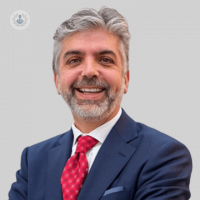What is the aortic valve and why is it important?
Autore:Aortic valve surgery is a procedure aimed at addressing issues related to the aortic valve, which is a vital component of the heart responsible for regulating blood flow. If you or someone you know is facing the possibility of this surgery, it's natural to have questions and concerns. In his latest online article, Mr George Asimakopoulos aims to provide you with a clear understanding of what aortic valve surgery entails, when it may be necessary, and what to expect before, during, and after the procedure.

What is the aortic valve and why is it important?
The aortic valve regulates the passage of blood from the heart to the rest of the body. It opens to allow blood to be pumped out of the heart into the aorta (the main artery of the body), and closes to prevent blood from flowing back into the heart during relaxation. Over time, the aortic valve can become diseased or damaged, leading to problems with blood flow and overall heart function.
When is aortic valve surgery needed?
Aortic valve surgery is typically recommended when the valve becomes narrowed (stenosis) or starts leaking (regurgitation), impairing its ability to function properly. Symptoms such as shortness of breath, chest pain, dizziness, and fatigue may indicate a need for surgery. Your cardiologist will assess your condition using imaging tests like echocardiography to determine the severity of the valve problem and whether surgery is the best course of action.
Types of aortic valve surgery
There are primarily two types of surgeries for the aortic valve:
- Aortic valve replacement: This involves removing the damaged valve and replacing it with a mechanical valve (made of durable materials) or a biological valve (from human or animal tissue). The choice of valve depends on factors like age, overall health, and lifestyle preferences.
- Aortic valve repair: In some cases, the valve may be repaired rather than replaced. This option preserves the patient's own valve tissue and can be a preferred choice for younger patients or those with specific valve conditions.
Preparing for surgery
Before surgery, you will undergo a comprehensive evaluation that includes blood tests, imaging studies, and possibly a consultation with other specialists to ensure you are in the best possible health for the procedure. Your medical team will provide detailed instructions on how to prepare, including any medications to adjust or discontinue before surgery.
During the procedure
Aortic valve surgery is performed under general anaesthesia, meaning you will be asleep and pain-free throughout the procedure. The surgical team will carefully monitor your heart and other vital signs during the operation. The duration of the surgery can vary depending on the complexity of the case, but advancements in surgical techniques have made the procedure safer and more efficient.
Recovery and rehabilitation
After surgery, you will be closely monitored in the intensive care unit (ICU) initially, and then moved to a regular hospital room as you recover. Physical therapy and cardiac rehabilitation may be recommended to help strengthen your heart and improve overall cardiovascular health. Your medical team will provide guidance on medications, wound care, and when you can gradually resume normal activities.
Mr George Asimakopoulos is an esteemed cardiac surgeon. You can schedule an appointment with Mr Asimakopoulos on his Top Doctors profile.


